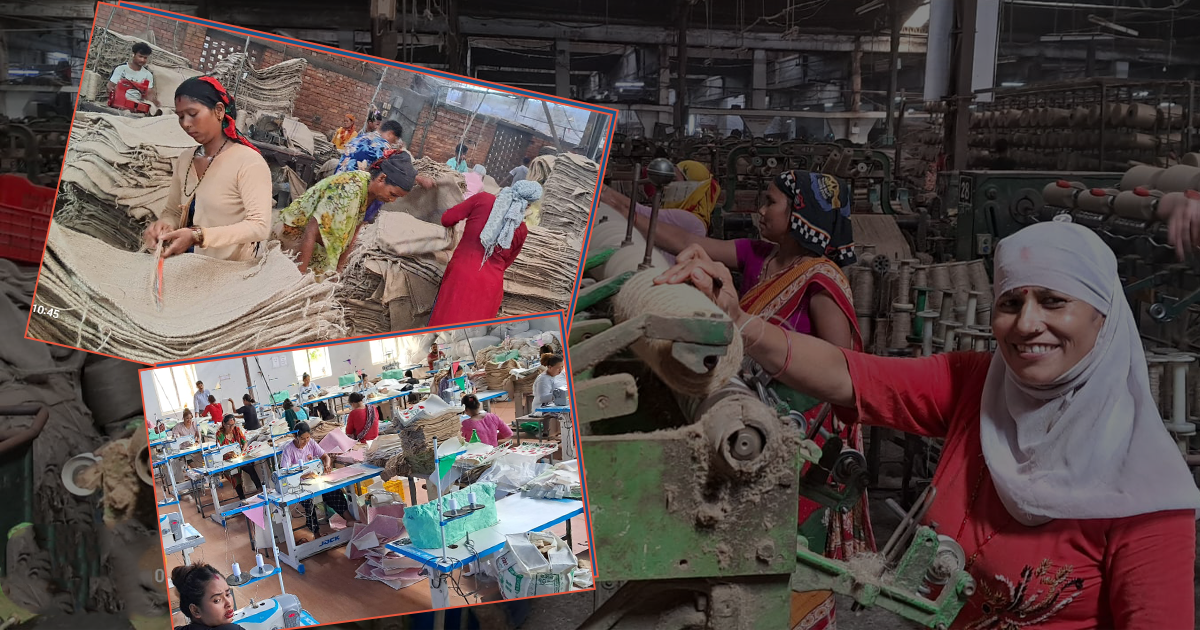Biratnagar: While thousands of young Nepalis queue at Tribhuvan International Airport daily in search of employment opportunities abroad, the Sunsari-Morang Industrial Corridor in Koshi Province paints a strikingly opposite picture — a steady influx of Indian workers seeking jobs in Nepal’s growing industries.
The corridor, home to over 600 small and large industries, employs more than 50,000 workers. Of these, nearly 20,000 — mostly skilled and highly skilled — are Indian nationals, according to preliminary estimates. The remainder are Nepali citizens, largely employed in low-skilled, manual labour roles.
Industry operators confirm that most technical and supervisory positions are occupied by Indian workers, while Nepalis are primarily employed at lower levels. “Indian workers are preferred for skilled roles, including machine operators, plant supervisors, boiler operators, and even administrative and managerial positions,” said one local industrialist.
Industries often avoid social security obligations by employing Indians, as companies are not required to enroll foreign workers in Nepal’s Social Security Fund. “Employers open salary accounts for Indian workers with embassy approval, and pay directly to those accounts,” the industrialist noted.
According to Durga Acharya, a Factory Inspector at the Labour and Employment Office in Biratnagar, almost all factories in the corridor employ Indian workers. However, industries have not officially declared how many Indian workers they employ.
The labour office collects such data only during inspections, which are limited due to resource constraints. Currently, the office has managed to inspect less than 10 percent of the industries in Morang and Sunsari.
Acharya said most companies hire Indian workers through labour suppliers. “Without Indian workers, these industries simply wouldn’t operate,” he stated.
A closer look at the corridor reveals a striking reliance on Indian expertise. In Arati Strips alone, out of over 800 workers, nearly 600 are Indian. The company’s investors, senior managers, and technical staff are also Indian nationals.
“The decision to hire Indians is based purely on skill,” said administrative head Jeevan Timilsina. “It’s easier too, as we don’t require labour permits for Indian nationals.”
He emphasized that skilled Nepali workers are hard to find, and even when available, they tend to engage in politically motivated protests and strikes, which affect productivity.
“To avoid such disruptions, many industrialists prefer Indians, who are less likely to get involved in local politics and are more focused on their work,” Timilsina added.
Another reason for the preference is labour laws. Firing Nepali workers often results in demands for compensation and can lead to strikes. In contrast, terminating Indian workers is comparatively simple — industries usually just provide basic medical support in case of accidents and send them home, avoiding hefty compensation payouts.
Preliminary data from the labour office shows that Arati Strips employs 600 Indian workers, Reliance Spinning Mills in Khairana, Sunsari employs 197, Baba Vegetable Industries has 45, Swastik Oil employs 34, Arvind Pulp and Paper Mill has 18, Tricot Pvt. Ltd. has 40, Jayashree Fuse Tech has 38, and Marbo Cutis Pvt. Ltd. employs 26 Indian workers — totalling nearly 1,000 Indians in just a handful of companies.
Across the industrial zone, Reliance Spinning Mills stands as one of the largest employers, with over 4,000 workers. Of these, 197 Indian nationals hold key technical and managerial positions.
“Almost all skilled and highly skilled roles are held by Indians because suitable Nepali candidates are rare. And if found, they are often more politically engaged than productive,” said administrative chief Mahesh Pokharel.
In many plywood industries across Sunsari, Morang, and Jhapa, Indian labourers dominate the workforce.
“Out of the nearly 50 plywood factories in these districts, most are run by Indian workers who even lease the machinery and subcontract work to a few Nepalis,” said Ramesh Thapa, president of the Koshi Province Factory Workers’ Union. “While Nepali workers earn about Rs. 500 a day, Indians can earn up to Rs. 1,000.”
Manoj Magar, former vice president of the national trade union GEFONT, echoed similar sentiments. “Most of the major factories in Morang, Sunsari, and Jhapa rely on Indians for machine operations, boiler handling, plant management, and administrative duties,” he said. “Industries prefer Indian workers not just for their skills but because they are not entitled to severance benefits under Nepali labour law, unlike local employees.”
Often, industries contract Indian workers for both production and technical services. These imported workers even receive production targets and performance-based contracts, making them an integral part of factory operations.
Nanda Kishore Rathi, President of the Chamber of Industries Morang, acknowledged this growing dependence.
“Without Indian workers, the industries here cannot function. We don’t have enough skilled workers in Nepal, and those available are often influenced by political parties. Indian workers, on the other hand, are apolitical and prioritize their jobs,” Rathi explained.



Comment Here